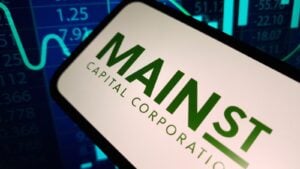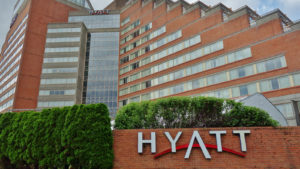But monthly dividend stocks pay shareholders each month, for 12 payments per year.
Many of these monthly dividend stocks offer high yields. This article will discuss three of the top high-yielding monthly dividend stocks today.
Main Street Capital (MAIN)

Main Street Capital is a business development company (BDC) that provides long-term debt and equity capital to lower-middle-market companies and debt capital to middle-market companies.
This BDC defines lower-middle-market companies as generally having annual revenues between $10 million and $150 million. The company’s investments typically support management buyouts, recapitalizations, growth financings, refinancing and acquisitions.
As of the end of Q1, Main Street had an interest in 81 lower-middle-market companies (valued at $2.4 billion), 22 middle-market companies ($239 million) and 88 private loan investments ($1.5 billion). Aggregate liquidity was $1.217 billion, consisting of $115 million in cash and cash equivalents, and the corporation had $1.102 billion of unused capacity under the revolving credit facility.
According to first-quarter results, net investment income of $89.8 million was an 11% increase compared to $81.0 million in Q1 2023. The corporation generated net investment income per share of $1.05, up 3% year-over-year, and distributable net investment income per share totaled $1.11, up 4% from the same period last year.
How does this translate to this BDC’s monthly dividends? Main Street’s net asset value per share increased compared to December 31st, 2023, from $29.20 to $29.54, and the corporation declared monthly dividends of $0.245 to be paid in the third quarter of 2024. These are 6.7% higher than those declared a year ago, and investors received a supplemental $0.30 dividend that was paid in June.
MAIN pays a monthly dividend which currently yields 5.8%.
Gladstone Capital (GLAD)

Gladstone Capital is a BDC that primarily invests in small- and medium-sized businesses. These investments are made via a variety of equity (10% of portfolio) and debt instruments (90% of portfolio), generally with very high yields.
Loan size is typically in the $7 million to $30 million range and has terms up to seven years.
According to second-quarter earnings posted in May, total investment income increased $0.8 million, or about 3.3%, from the year-ago period.
The gain was driven by a $0.7 million increase in interest income, which itself was driven by a 3.5% increase in the weighted average principal balance of interest-bearing investments. Net investment income came to 25 cents per share, or $10.8 million, for the quarter. The net increase in net assets resulting from operations was $23.6 million, or 54 cents per share. Unrealized appreciation was the big driver of the gain in this quarter.
The yields on the company’s portfolio influence its ability to earn income and therefore cover its expenses and pay distributions to shareholders. Over time, the company’s portfolio yield has drifted higher to 14%.
Despite the cost of funding rising as well, the company’s portfolio continues to grow in dollar terms, and the higher spreads on a larger portfolio is leading to earnings growth.
GLAD stock currently yields 8.4%.
Apple Hospitality REIT (APLE)

Apple Hospitality, a hotel real estate investment trust (REIT), owns a portfolio of 225 hotels with 29,900 guest rooms across 88 markets in 38 states. It franchises out to leading brands, including Marriott, Hilton and Hyatt.
The REIT’s first-quarter results reported a net income of $54.1 million, a 64.2% increase from the previous year. Operating income grew by 45.4% to $71.6 million, and Adjusted EBITDA for real estate increased by 5.8% to $100.8 million.
The company’s average daily rate (ADR) was $153.18, and occupancy remained steady at 72.0%, resulting in a RevPAR of $110.25. Despite these gains, comparable hotels adjusted EBITDA slightly declined by 3.2% to $111.7 million.
Over the last decade, APLE has generated impressive annualized FFO/share growth. This is thanks to its increasing scale and an effective and efficient business model. The REIT also enjoyed strong economic tailwinds in the U.S. during that time.
However, growth slowed meaningfully in recent years, due to the pandemic and resulting spike in demand for services like AirBnB. That said, demand for hotels is improving and we expect a 2.4% NAV per share CAGR moving forward.
APLE is not very recession-resistant, but several factors may enable it to outperform its peers in such conditions. The trust has strong brand names, excellent locations, a strong balance sheet, a great franchising model and emphasis on value.
With one of the lowest debt-to-equity ratios in the sector, APLE boasts plenty of liquidity and a well-laddered debt maturity profile. As a result, it’s well-positioned to respond opportunistically to averse economic and/or market conditions. It has done this successfully in the past by repurchasing shares at a steep discount.
APLE stock currently yields 6.3%.
On the date of publication, Bob Ciura did not hold (either directly or indirectly) any positions in the securities mentioned in this article. The opinions expressed in this article are those of the writer, subject to the InvestorPlace.com Publishing Guidelines.
On the date of publication, the responsible editor did not have (either directly or indirectly) any positions in the securities mentioned in this article.
Bob Ciura has worked at Sure Dividend since 2016. He oversees all content for Sure Dividend and its partner sites. Prior to joining Sure Dividend, Bob was an independent equity analyst. His articles have been published on major financial websites such as The Motley Fool, Seeking Alpha, Business Insider and more. Bob received a bachelor’s degree in Finance from DePaul University and an MBA with a concentration in investments from the University of Notre Dame.
